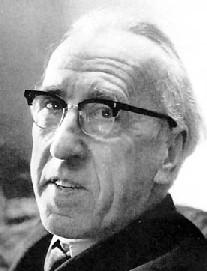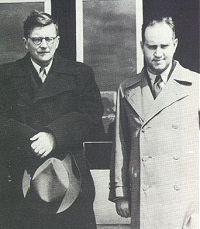Earwitness #74: Tsjajkovski’s second violin concert. ‘Everything in memory of you…’. Today in our series about 20th century Russian music we will go together with the World Peace Council to New York to, among other things, look for the “second violin concert of Tsjajkovski”.
The World Peace Council first assembled in Wroclam, Poland in August 1948. As a continuation the Scientific and Cultural Conference for World Peace took place in the Waldorf Astoria-hotel in New York City in March 1949. Although all of his work was banned and he lost his job at the conservatoire Sjostakovitsj had to join the Soviet delegation as a pre-eminently music exponent. He didn’t want to so he received a notorious nightly phone-call from Stalin, who asked him: “What is wrong with your music?” “Well”, Sjostakovitsj answered, “Nobody is allowed to play it anymore”. “Really? I didn’t know. We will look into that, and you will go Sjostakovitsj, you will go to America.” And the composer went, what led to many painful confrontations because he was forced to express things he didn’t want to.
Steffen Schleiermacher plays ‘Two Compositions for piano’ by Arthur Lourié (left): the ‘Berceuse de la chevrette’, and ‘A Phoenix Park Nocturne’. After the German invasion in Paris Lourié crossed the ocean to America, with help from conductor Sergej Koesevitski. According to biographer Detlef Gojowy he “changed back into a Russian composer” even more than in France. At the time of the visit by Sjostakovitsj another famous Russian immigrant cellist Gregor Pjatigorski jokingly suggested Lourié to compose the “second violin concert by Tsjajkovski” Lourié was actually working on a piece for violin and strings, the ‘Concerto da camera’ that had its premiere on the Berkshire Music Festival in 1948. This baroque concerto doesn’t resemble Tsjajkovski much, but does deserve its own place in the repertoire.
During the rest of the broadcast we will play another three candidates for the designation of “Tsjajkovski’s second violin concert”, performed by the same solist to make an honest compasrison. It is the greatest Russian violin player of that time and maybe of all times, David Oistrach.
First you will hear him with the Russian State Symphonic Orchestra led by Karl Eliasberg in a recording from 1947, of the first violin concert by Nikolaj Rakov from 1944. The parts are Allegro, Andante en Allegro moderato.
 As steeled party member composer Dmitri Kabalévski (on the right) took ambiguous sides on the attack on Dmitri Sjostakovitsj. Striking is that he at first also was on the blacklist of the ‘formalists’ that were banned in 1948, but his name quickly disappeared from it. About him surprisingly little has been written. Kabalévski finished his opus 48 in 1948, the violin concert in C that David Oistrach played with the Russian State Symphonic Orchestra led by Karl Eliasberg.
As steeled party member composer Dmitri Kabalévski (on the right) took ambiguous sides on the attack on Dmitri Sjostakovitsj. Striking is that he at first also was on the blacklist of the ‘formalists’ that were banned in 1948, but his name quickly disappeared from it. About him surprisingly little has been written. Kabalévski finished his opus 48 in 1948, the violin concert in C that David Oistrach played with the Russian State Symphonic Orchestra led by Karl Eliasberg.
 One of the most beautiful violin concerts of the last century, and a serious contestant for the ‘second violin concert by Tsjajkovski’ is the first violin concert of Dmitri Sjostakovitsj, that of course can do fine without such carnival qualifications. The works came together in 1947-1948 in close collaboration with David Oistrach, who also opened it (on the right with the composer) The violin player says about this: “ The piece faces the violin player with an especially interesting and exciting task. It is a meaningful role that offers lots of opportunities for the soloist, not only to show his virtuosity but mainly to express his deepest feelings, thoughts and moods.” The meaningful motives in the Scherzo will be featured in another episode. According to the at the time orchestra leader Viktor Liberman of the Leningrads Philharmonic Sjostakovits told him that the closing Burlesque “reflects the happiness of someone who just hast been released from a concentration camp.” Arthur Vincent Sergejevitsj Lourié (1892-1966).
One of the most beautiful violin concerts of the last century, and a serious contestant for the ‘second violin concert by Tsjajkovski’ is the first violin concert of Dmitri Sjostakovitsj, that of course can do fine without such carnival qualifications. The works came together in 1947-1948 in close collaboration with David Oistrach, who also opened it (on the right with the composer) The violin player says about this: “ The piece faces the violin player with an especially interesting and exciting task. It is a meaningful role that offers lots of opportunities for the soloist, not only to show his virtuosity but mainly to express his deepest feelings, thoughts and moods.” The meaningful motives in the Scherzo will be featured in another episode. According to the at the time orchestra leader Viktor Liberman of the Leningrads Philharmonic Sjostakovits told him that the closing Burlesque “reflects the happiness of someone who just hast been released from a concentration camp.” Arthur Vincent Sergejevitsj Lourié (1892-1966).
1. Two Compositions for Piano (1936/38): 1) Berceuse de la chevrette, 2) A Phoenix Park Nocturne.
Steffen Schleiermacher, piano. [now]ART Hat Hut CD 115.
2. Concerto da Camera (1948): 1) Entrata: Allegro Capriccioso, ma non rubato, 2) Aria, lento ma non troppo, 3) Intermezzo, languido quasi adagio, 4) Fantasia, allegro molto appassionato, ma sempre dolcissimo, 5) Serenata, moderato, 6) Epilogo. Gidon Kremer, viool, Duits Filharmonisch Kamergenootschap led by soloist. Gidon Kremer Edition Brilliant Classics 8712.
3. Nikolaj Petrovitsj Rakov (Kaloega 4.3.1908 – Moskou 3.11.1990).
Violin concert no 1 in e (1944): 1) Allegro, 2) Andante, 3) Allegro moderato (recording 1947). David Oistrach, viool, Russian State Symphonic Orchestra led by Karl Eliasberg. Russian Revelation Vol. 1 RV10104.
4. Dmitri Borisovitsj Kabalevski (30.12.1904 – 14.2.1987).
Violin concert no 1 in C major, opus 48 (1948): 1) Allegro molto e con brio, 2) Andantino cantabile, 3) Vivace giocoso. David Oistrach, violin, Russisch Staatssymfonieorkest olv. Karl Eliasberg. 100 years Oistrakh / Brilliant Classics 9056/5. 5. Dmitri Dmitrijevitsj Sjostakovitsj (1906-1975).
Violin concert no 1 in a, opus 77 (1948): 1) Nocturne, 2) Scherzo, 3) Passacaglia – Cadenza, 4) Burlesca (opname 1962 Edinburgh). David Oistrach, violin, Philharmonics Orchestra led by Gennadi Rozjdestvenski. BBCL 4060-2.
Special thanks to Valentin Zhuk.








